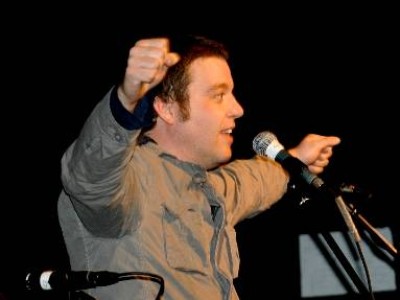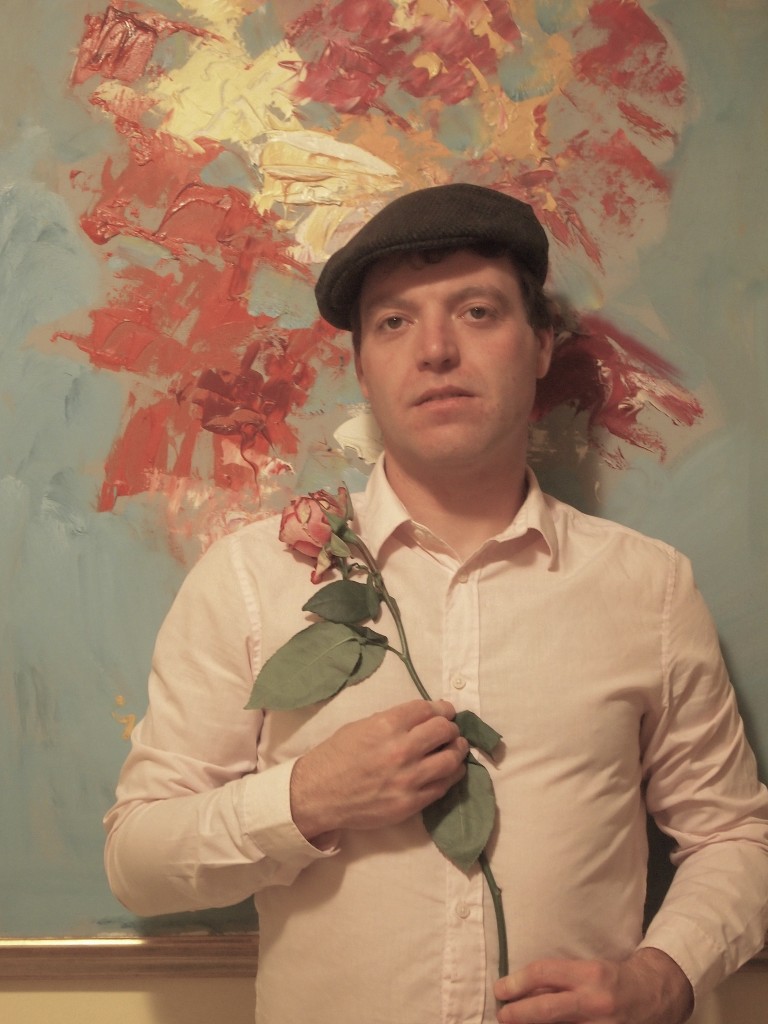Imagine you are tasked with the development of a creative writing course for secondary-level or adult students—and all you’re allowed to use is this Issue #9 of Penduline. What might you be tempted to use, and to what end?
I’d tell them to study the lot, rejoice in the contrary variousness, and be as contrary and various as possible themselves.
How did you first discover The Brownbread Mixtape, and what has your relationship been like over the years with Kalle and the contributors featured on his Penduline Irish Performance Poetry Showcase recording?
I was invited to perform some of my poems there in 2010, right after I had come back from Italy, where I had been working on my second collection, Invitation to a Sacrifice. It’s a very professionally run cabaret and it has featured many of the most engaging and entertaining live arts practitioners in the country. Kalle is an excellent host and curator, a fact proven by the popularity of the monthly event. Everybody wants a gig at The Brownbread Mixtape, just as they do at other live arts nights such as the Caca Milis cabaret, The House Presents, Nighthawks, Obheal, The Monday Echo, Over The Edge (formerly the legendary Glor Sessions) and so on. I recently did a joint event with The Brownbread Mixtape at the Dublin Writers Festival, involving the Dublin Young Authors group which I directed. The event was a roaring success and I’d be happy to work with The Brownbread Mixtape again, of course. Kalle probably has the closest to an overview of performance poetry in Ireland and he was the obvious choice to make a showcase selection for Penduline.
You are featuring Karl Parkinson in this issue. When and how did the two of you first meet?
We met at live arts events in Dublin around ’06 and ’07. Karl’s work and his work ethic have always impressed me and his poems deserve the wide, intelligent, open-hearted audience they are seeking. Karl isn’t afraid to ask the big questions and to try to answer them in his poetry. He’s a writer and a spirit on a grand quest and it is uplifting for me, and for anyone open to it, to participate in that through engaging with his work. When you realise that Karl has emerged like an angel from the flames of despair and self-destruction that threaten to envelop anyone, no matter how strong and courageous, who lives in his part of the inner city, you will realise what an especially autodidactic, parthogenetic character he is in artistic terms. He springs from nowhere – literally – illiterally even! An incredible rarity in contemporary literature, in Irish literature in particular, a self-taught writer from the lower classes who is not a depressed social realist or a cynical numbskull chasing fame by imitation of the current winning formula. He has his first book, Litany of the City and Other Poems, out this summer and I hope the feature will generate interest in it. It’s an honour for me and for Penduline that he has agreed to be our featured writer.
Whose idea was it to start the duo Droppin’ the Act, and how has the project been coming along thus far?
I don’t know who came up with the idea but we both wanted it to happen – what Karl and I do together in performance and writing tends to get intertwined like that till no-one can say who said/thought that line first. We have a genuinely trusting, genuinely loyal, genuinely collaborative artistic relationship, which is extremely difficult to find and so we both value it very highly indeed. I think it works because we’re both equally intelligent, equally driven, equally experienced, equally ambitious, equally committed. We’re both experimental populists with a visionary drive to our work. We are seeking and finding a higher meaning and a higher plane of existence through our artistic work and we want to share that experience of the exalted and the visionary with as many people as possible and the only way to do that profoundly is live on stage in front of a spontaneously reacting audience. We want to be innovative at the same time as communicating with, entertaining, and stimulating. Our shows go down really well. We have written a lot of performance material together which we are very happy with and we have performed it to a rousing reception in many of the venues and events around Dublin. We’re doing a little tour over the summer and will be launching an album in the autumn. Next year we plan to write a new show and tour more extensively and we are hoping to go the the States and Canada.
In your Ireland Unread interview featured in this issue, you’ve asked noted Irish writers to name an Irish writer, alive or dead, whose work ought to be more widely read. Whom might you have named?
Funnily enough the Irish writer who I think is both most and least read is James Joyce. Dubliners is the Ur-text of the last century of Irish melancholy naturalism, which is our default/dominant expressive mode in long and short fiction; Dubliners has been rewritten dozens and dozens of times and is being rewritten all over Ireland right now no doubt and often by people who have never read it. They don’t have to read it to have been influenced by it since its influence is so general. They are influenced by Dubliners through its influence on others they have read and absorbed the same way so many American short story writers write sub-Carveresquely even though they have perhaps never even heard of Raymond Carver. On the other hand you could read mainstream Irish fiction as a project designed to repress the memory, deny the existence, and hold off for as long as possible the clean-sweeping apocalypse of Ulysses and Finnegans Wake.
I was truly impressed with Kevin Doyle’s short story (“Rotting in a Horse-Box”) for its stealthy unfolding and delivery of such a powerful and disturbing theme.
Kevin is a very strong writer who has been writing engaging and entertaining work for years. Readers and live audiences enjoy his stories and are stimulated by them. It’s time he put a book out, one way or another.
Economic and social injustices factor in several works in this issue.
It would be embarrassing and remarkable if they didn’t, considering the overwhelming facts and effects of economic and social injustice in contemporary Irish life. Although Irish literature, for much of the 20th century at least, has a remarkable record of silence, with glorious exceptions, when it comes to issues of profound class injustice, such as the treatment of the traveler minority, or the sadistic incarceration of tens of thousands of impoverished children by religious orders with state connivance. Perhaps it would have been a truer reflection of ‘Irish’ literature if I had barred all reference to injustice.
Is it a good time right now to be an aspiring Irish poet, storyteller, or writer? Why or why not?
It isn’t really a good time to be anything in Ireland except a crooked politician, banker or businessman or one of their arselickers. It’s the time of the wolf in Ireland. And this is true in the arts as well as everything else. You need to be very thick-skinned, very determined, perhaps even a little bit vicious, as well as very talented to be able to stick at professional arts practice in Ireland now if you are coming from outside the establishment. Who comes through the next few years without quitting or going over to mammon will last a long while. On the other hand, there is a huge amount of good will, fruitful collaboration, and practical solidarity between Irish writers of my generation and among the various scenes I’m involved in. Above all, there’s a serious commitment to writing as a contemporary and open-ended artform among a growing and solid body of people and I think that bodes very well for the future. Involvement with various editing and teaching projects has also introduced me to a good deal of writers in their twenties and even in their teens who are very talented and eager and, crucially, brazenly disrespectful of elders and traditions. I’m looking forward to seeing these develop over the next few years.
You are a strong proponent and practitioner of spoken word in Ireland. How much of the engine behind Irish spoken word do you think stems from Irish oral tradition, and how much would you say comes from international trends in literature, and stylistics from elsewhere?
I think that the interesting thing about spoken word in Ireland is the different combination of influences, local, national, global, biographical, folk, rock and roll, avant-garde, traditional, stand-up. shamanism etc., you find in each unique practitioner. Irish spoken word is far less slam-oriented than American spoken word seems to be and I think this allows diversity and individuality to be the ruling principle among us Irish. Slam, though I sometimes enjoy it, if it comes to dominate imposes an awful homogeneity on all its participants who are all trying to basically do the same thing better than anybody else in order to win. Slam is more of a gladiatorial kind of sport involving poetry as its weapon of choice, rather than an art. In poetry as art we kill each other much more slowly and deliciously. There is no such easily definable thing as ‘Irish oral tradition’ really, just lots of different and contradictory experiences and perspectives, and Irish spoken word, less obviously competitive than its American counterpart at least, allows these contradictions to flower on the stage. In Irish spoken word we compete to be different I guess is what I’m saying, and that’s a much more interestingly diverse space to be involved in. Variety is health, right? Homogeneity is death at any rate.
You are very busy in your profession as a writer, teacher, and performer, but if there were 48 hours in a day, I would tell you you ought to have your own literary magazine. If you ever decided to found one, what do you imagine it would feature? What purpose would you have it serve? Print, electronic, or both? Whom might you see yourself teaming up with in an editorial capacity?
Watch this space. News coming shortly. I have been looking to establish an outlet for Irish avant-garde practice, across a few artistic disciplines — performance writing, experimental literature and film, contemporary music, sound art, to name some — that could make full use of the internet in term of video and audio as well as text, that would include high quality critical writing, and that would participate in the global avant-garde. That’s now getting off the ground with a few other driven maniacs on board and we will be announcing full details in September.
How can Irish writers and performance artists become better known in Ireland and around the world? What in your view might be some effective strategies for promoting them and their work?
I think doing things like submitting to the likes of Penduline, and using the internet more effectively through websites, audio, video and so on is one approach. Another is to club together to organise tours and hire publicists and the like at shared expense.




